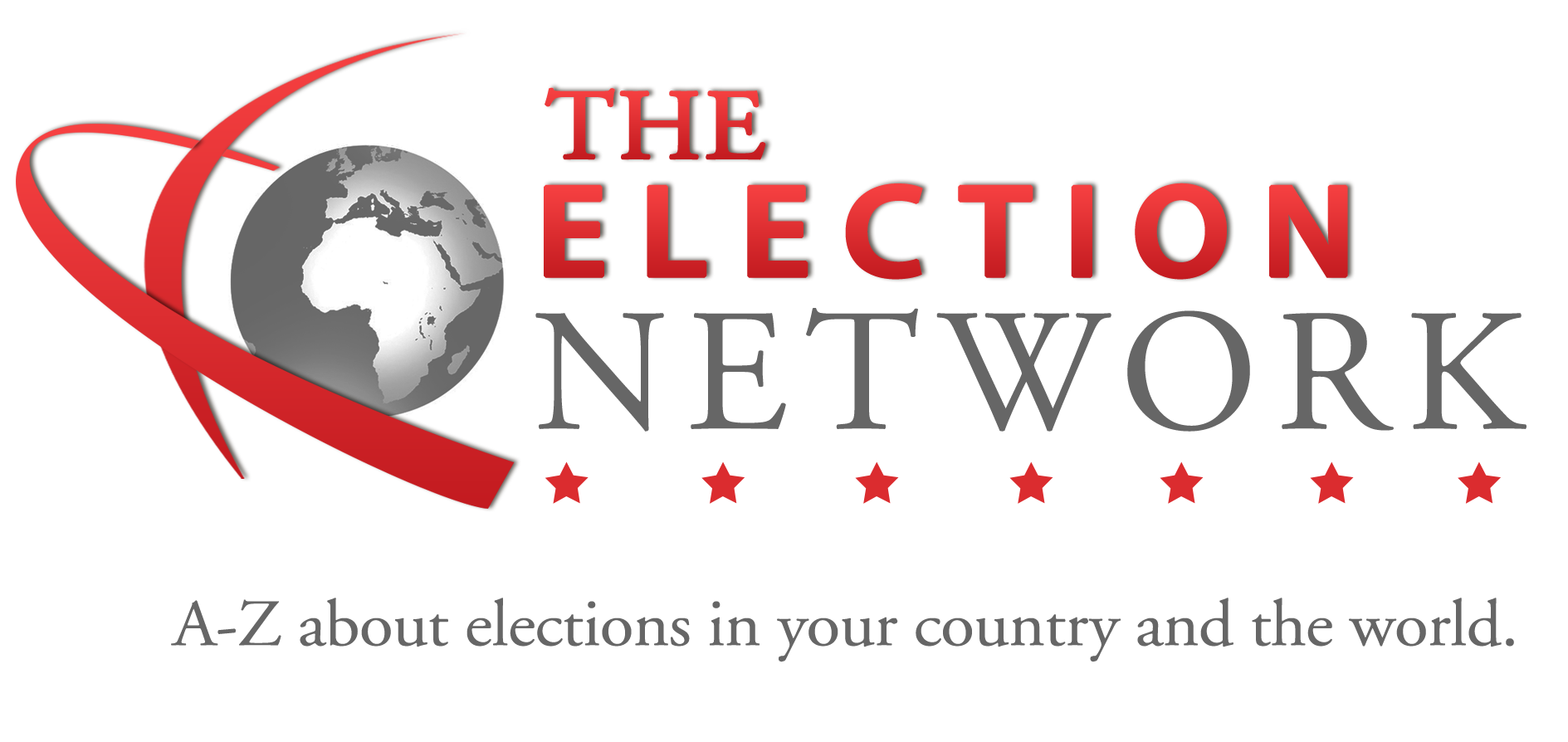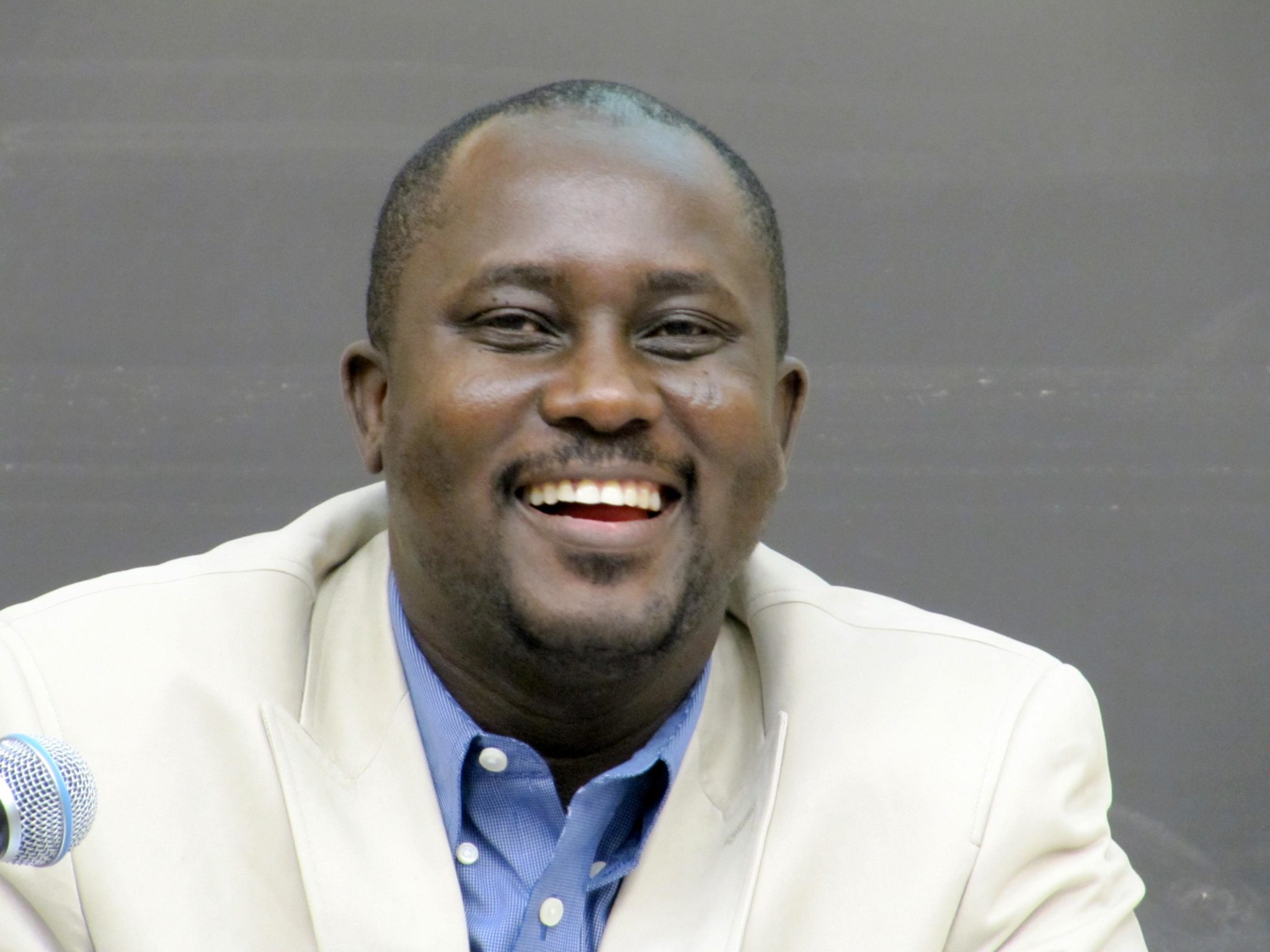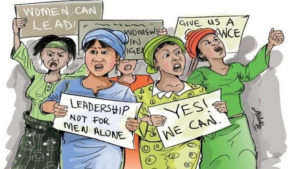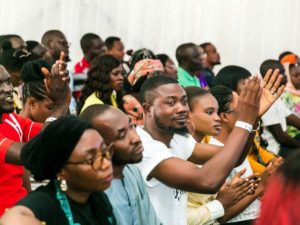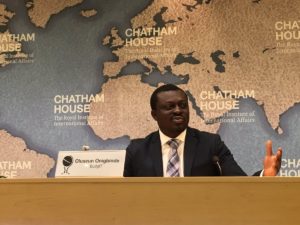Pius Adesanmi is a Nigerian intellectual and public analyst, a Professor of Literature and Director, of the Institute of African Studies at Carleton University, Ottawa, Canada. Professor Adesanmi spoke to us about the significance of the Nigerian 2019 elections taking place in the next 24 hours. He harped specifically on the issue of electoral violence.
As seen from your commentary on both social media and mainstream media, you seem to be quite concerned about the fragility of the Nigerian state. How important do you think the 2019 General Election is for the country in terms of stability?
Thanks, Mercy. First, let me commend, once again, the excellent work you do for Nigeria. I’ve said it once and it bears repeating: mine is a failed generation that now shamelessly has to latch our hopes for Nigeria to the work that exceptional citizens in your generation, such as yourself, are doing. Now to your question. It is perhaps auspicious that talking about you brings the generational question to mind. I know that it is a cliché of political discourse all over the world to label every election the most important election in a country’s history. If you look at American politicians, for instance, every election, they claim, is the “most important election of our lifetime.” However, in the case of Nigeria 2019, it is safe to say that we are not in the province of metaphors, clichés, or hyperbole. The 2019 election is truly and literally the most important of our lifetime. This is the case because it is an election of generational transitions. By 2023, much of the millennial demographic would have moved closer in age to my generation. And those of us in my generation who are still forming youth with millennials on social media will finally have to accept the actuality of our undeniable Babahood and Mamahood. So, those who are going to be elected on February 16, 2019 will preside over transitions in Nigeria’s demography with considerable social, cultural, political, and economic implications. They are going to preside over climacteric changes in the national demographic at a time of heightened invidiousness along our traditional fault lines – ethnicity, religion, and political affiliation. We are either going to elect people who are aware of these dynamics and nuances or analog ignoramuses who will make Nigeria miss out on the knowledge economy.
Do you agree with the recent predictions from the Crisis Group and other international risk analysts which are signalling that the 2019 general elections might be more violent than the previous elections?
Well, for starters, Nigeria has become a more violent society over the course of the last four years. All the spectres of physical and symbolic violence have become even more accentuated, from terrorism to armed robbery, kidnappings, and political brigandage. Symbolic and physical violence have become the currency of the politics of everyday life in Nigeria. The public commentator, Ayo Sogunro, captures it all with his increasingly popular maxim, “Nigeria will kill you”. This bespeaks a relationship between citizen and state rooted in and governed by violence at a fundamental level. All the ingredients are there for 2019 to be an expremely violent election cycle. Added to these scenarios is the fact that the political class continues to misapprehend the extent of the discontent in the land. Apart from a generalized discontent occasioned by President Buhari’s incurable provincialism and clannishness, the unaddressed rumbles of Biafra, south-south resource exploitation resentment, middlebelt disaffection, and the rumbles in a fragmented north fed by so many issues are rolled into a security, law and order cauldron by Nigeria’s ignorant leadership. These unaddressed or wrongly-addressed issues could be exacerbated by the gnawing, killing poverty across the land and the determinantion of an increasingly desperate Buhari regime (well, they behave like a regime!) to organize an unfree and an unfair election. Just look at the pattern of desperation: President Buhari refused to sign the new electoral bill, all the structures and institutions of state are being violated and coerced into Buhari-worship, the CJN, warts and all, was desperately, messily, and illegally removed from office in a manner that lends credence to political readings of the affair. We have laid a foundation for a very violent election cycle and that is why Nigeria’s favorite meddlers, the United States and UK/EU, have thrown caution to the wind and are openly interfering in our domestic affairs to caution against violence.
What are your own top 3 concerns ahead of the 2019 General Elections? What is your assessment of INEC’s readiness for the 2019 elections and do you have confidence in its ability to conduct free and fair polls in 2019?
Obviously, I am very worried about the possibility of violence and the attendant loss of lives. We are already losing lives in the campaign season and that is tragic. People are dying in campaign crowds because the unscrupulous politicians who weaponize poverty, loot the treasury in order to pay these rented crowds, do not even bother to guarantee 21st-century crowd safety and control standards. Hence, our people go to campaign grounds to die because they have been mobilized with as little as N100 naira. Secondly, I am extremely worried about the fragility of our institutions. They are not growing. Since 1999, we have been dealing with increasingly weakened institutions. Now we are heading into an election in which every institutional bulwark of democracy has been weakened and appropriated into the myth-making machinery of the incumbent. Where is the separation of the EFCC from the persona of the incumbent when EFCC Chair, Ibrahim Magu, once took to wearing the President’s campaign lapel pins? Where is the separation of the Armed Forces from the mythology of the President when all the Service Chiefs just happened to accidentally stumble into a presidential campaign event? I can go on, but I guess I have already segued into your last question about INEC’s readiness and ability. I don’t know too much about the current INEC Chairman but I’ve read assessment snippets by people I trust. There seems to be a consensus that he has a lot of integrity and is credible. However – and there is always a tragic however to an optimistic assessment of anything Nigerian – he and INEC are operating in the context of an overall institutional debauchery that I have been analyzing. In the context of institutional synergies, for instance, you are only as good as your weakest link. If you, INEC, put your best foot forward, what happens when another institution, the police, has been co-opted? You are not protected. Your offices are mysteriously set ablaze. Your capacity to effectively deliver PVCs is seriously undermined and we start to hear stories of citizens being disenfranchized because they cannot collect their PVCs.
A number of flags have been raised by the opposition and a section of the civil society. What do you make of the recent arrests and criminal investigations of opposition figures like Senator Dino Melaye?
Those concerns are genuine because the Buhari regime has a track record of hiding behind the one finger of a ridiculously-prosecuted anti-corruption war to hound the opposition and people whose voices or faces they do not like. Don’t forget that this is a regime that has shown itself capable of mass murder as we have witnessed with the case of El Zakzaky’s shiite followers. Look at how long they have defied court orders – after massacres of civilians – and have kept El Zakzaky and his wife in jail. Look at Deji Adeyanju. However, Nigeria is a very complicated body politic. The biases, weaknesses, and corruption of the incumbent very easily play into the hands of corrupt charlatans who delude themselves as “the opposition” and proceed to break the law, and just generally misbehave. Dino Melaye is one such charlatan. He is a court jester with no legitimacy and he imagines he can disregard lawful police invitations backed by warrants. We must not tolerate such misbehaviour from members of the political elite. Ayo Fayose is another charlatan. He is no opposition. He is just lucky that President Buhari’s anti-corruption war has been so biased, so tragically one-sided and nepotistic, that a Fayose who was caught on audio tape receiving his own share of the Dasuki ATM, now has grounds to scream opposition harassment whenever the wheels of justice roll in his direction. It is such a shame!
As a Nigerian in the diaspora, who would not be able to vote what are the issues that matter to you the most (assuming you had an opportunity to)?
I only one issue: education. Mercy, education is the proverbial egg before the chicken or the chicken before the egg. I have been at the forefront of advocacy for education, especially higher education, for a very long time. Maybe I have a keener sense of the Nigerian tragedy because I do a lot of capacity building work at the doctoral and postdoctoral levels for Universities in many countries across Africa. Maybe it is because I have also spent more than half of my entire adult life in Canadian, US, and European Universities so I find that I cannot sleep at night because of the predicament of Nigeria. Nigerians have no idea just how bad it is and, sometimes, I feel like I have to give up because you don’t even know where to start. All I can tell you is we need people in office who understand that we need to declare a state of emergency in the education sector. There is need for a complete overhaul of public education at all levels. Infrastructure decay and welfare of teachers and students are just a fraction of the problem. The entire value system needs emergency surgery. We have kids in primary and secondary school who would rather aspire to grow up and be like MC Oluomo than try to become Nigeria’s first Nobel Prize for Physics. Who Physics epp? If I harp too much on the importance of education, they will dismiss me and tell me to gbe body! Or they start O jewa ke eng, Pius Adesanmi edition. So, education is my only issue. It is my only issue because I don’t believe that the collapse of the education sector in Nigeria is an accident. If you are determined to run Nigeria the way Nigeria has been run by the leaders she has been cursed with since independence, the last thing you need is a well-educated citizenry with an elevated capacity for critical reasoning and engagement. To run Nigeria the way she is run, you need to manufacture sheeple on a large scale. You need to manufacture citizens who would allow you to preside over 100 days of a national University shut down and suffer zero electoral consequences. To manufacture such citizens on a massive national scale, you need to destroy education. The Nigerian political elite have been very efficient about this. The collapse of education in Nigeria is purposed and deliberate.
A number of people have said that the election is a two horse-race between the main opposition PDP and the ruling APC. You appear to be highly critical of both and have indicated some support for third-party candidates. What chances do you think they honestly have?
People have a very short-term view of the entire third force project. If there is one lesson that those of us on the third force train could learn from the establishment despoilers of Nigeria like President Buhari and Alhaji Atiku Abubakar, it is the longevity of ambition. Look at how many times Buhari ran for President and persisted. Many millennials were not born when Atiku Abubakar first set his sight on a presidential run. These men have persisted, and you’ve got to give it to them. It means that we third forcers have no excuse. Persistence and application have to become the motto of the third force movement. In my own opinion, Oby Ezekwesili, was the best among the third force prospects. Now that she is out, Kingsley Moghalu, Omoyele Sowore, Fela Durotoye, and Donald Duke are slugging it out. How fo we conjugate the strengths of all these people into a more manageable pathway for the force in 2023? What do we have to learn from the strengths and weaknesses of their individual runs? How do we identify the long-distance runners among them or are they all just going to fizzle out after February 16, 2019 and resurface in 2023 a few months to the election? So, we need to have sustained pan-Nigerian third force stakeholder consultations after the election. Nigerians, in principle, have already bought the idea of the third force. What I hear is criticism that many started too late, the lack of a united front, etc. Third forcers need to listen to the people.as we remain in the trenches for 2023.
What is your take on the quality of the campaigning so far from the parties involved in the elections?
Needless to say, I have not been impressed by the campaigns of the Siamese twins – APC and PDP – because, alas, it is the same scenario we are used to: constipated, clichéd manifestos and promises that the candidates and party henchmen mouthing them have not read; violence; corruption; looting the treasury to fund campaign activities, being clever by half as they receive the proceeds of corruption as campaign donations. President Buhari and his wife and their acolytes have been using Presidential jets for campaign. That is impunity. APC ought to refund the treasury for every campaign trip President Buhari undertakes in that jet. So, these campaigns have been primitive, totally devoid of depth and grand organizing frameworks for Nigerian nationhood. The third party campaigns on the other hand have shown glimpses of a new dawn to come. Look at Oby Ezekwesili, she retired her campaign funds. Only one other presidential candidate, Professor Remi Sonaiya, who ran on the platform of KOWA Party in 2015, has retired campaign funds. Look at Omoyele Sowore and the structures he has built at home and in the Diaspora in such a short time. Third party candidates have shown that it is possible to run a campaign
If you were appointed INEC Chairman (as a Professor you fit the mould of the potential candidates) what would be your key aspect of electoral reforms and why?
Being a University Professor doesn’t necessarily mean that I’d be the right person to run INEC. I don’t want us to fetishize the professoriate. However, Nigeria does not need new electoral reforms. You know why? The Justice Mohammed Uwais report on electoral reforms has been gathering dust under the rugs at Aso Rock Villa since 2008. Basically, we are a very unserious country. There is no political will for excellence and renewal. The pathway out of our current quagmire is in that report. We have had no political will to act on that report. Nothing that would eventuate in a better body politic is ever implemented in Nigeria. Chapter 7 of the Uwais report is entitled, “Sanitizing Nigeria’s Electoral System”, Chapter 8 is entitled, “General Recommendations”. It is a 319-page report, a product of Nigerian genius and application. Mercy, everything we need to do is in there. However, I can bet that none of the current court jesters in the political arena (I am talking about the establishment politicians) has ever read that document. And we think we can headway? I think we play too much!
